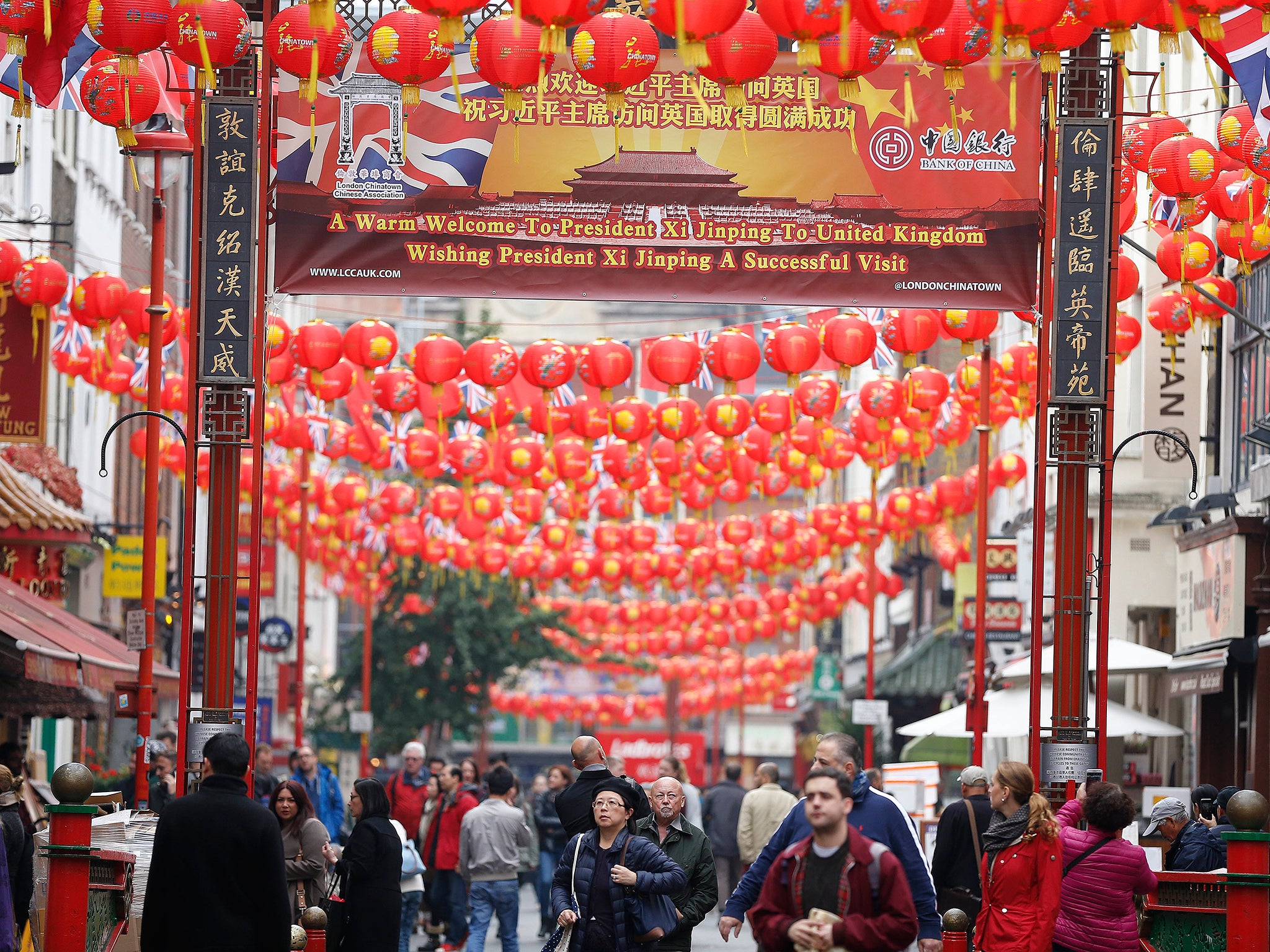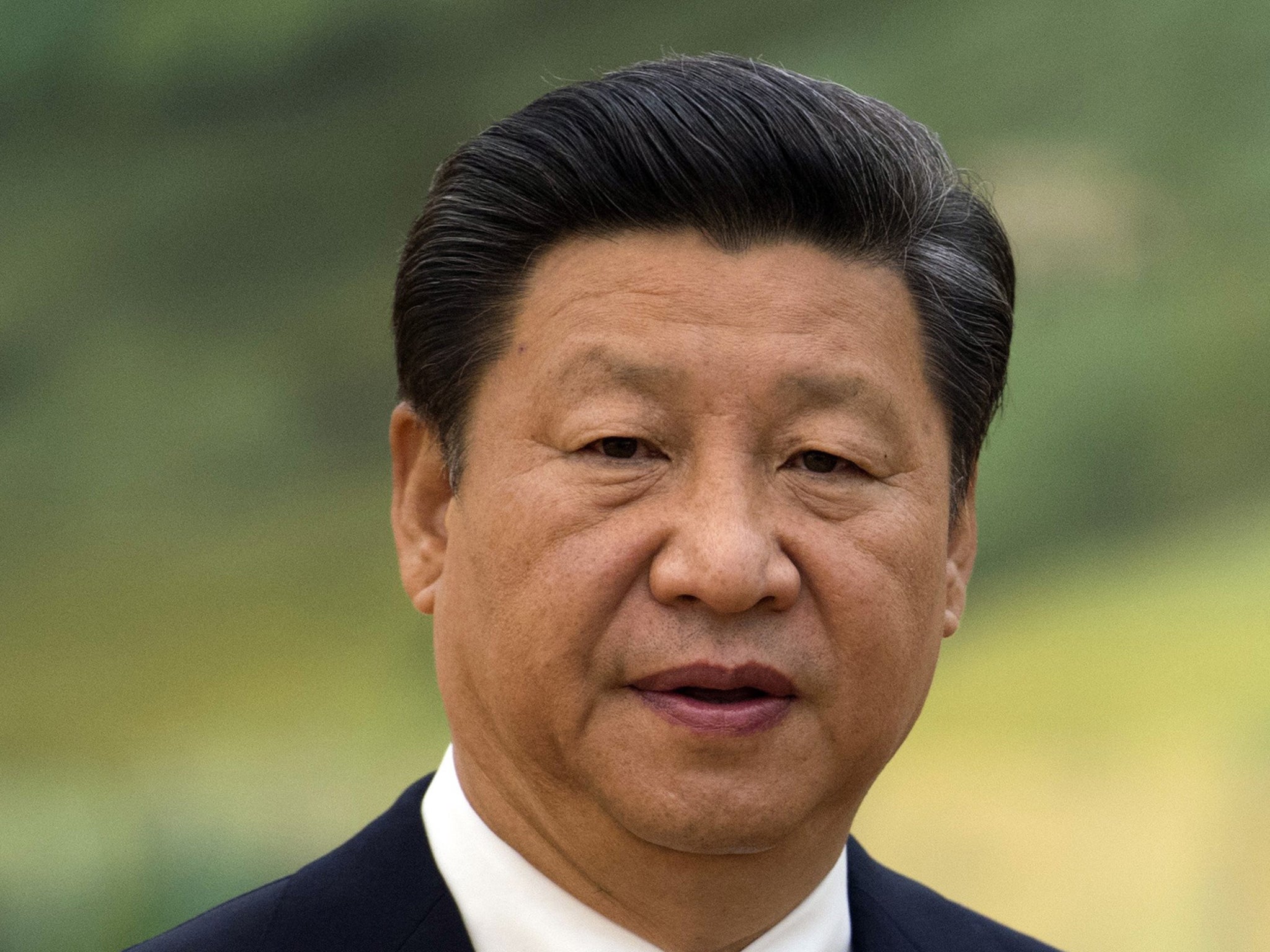China state visit: Campaigners angered ahead of visit that 'heralds golden era' of UK-Chinese relations
Critics are furious that the UK is trading away human rights in the pursuit of lucrative deals on HS2 and nuclear energy

Your support helps us to tell the story
From reproductive rights to climate change to Big Tech, The Independent is on the ground when the story is developing. Whether it's investigating the financials of Elon Musk's pro-Trump PAC or producing our latest documentary, 'The A Word', which shines a light on the American women fighting for reproductive rights, we know how important it is to parse out the facts from the messaging.
At such a critical moment in US history, we need reporters on the ground. Your donation allows us to keep sending journalists to speak to both sides of the story.
The Independent is trusted by Americans across the entire political spectrum. And unlike many other quality news outlets, we choose not to lock Americans out of our reporting and analysis with paywalls. We believe quality journalism should be available to everyone, paid for by those who can afford it.
Your support makes all the difference.It’s been described as the state visit that will “herald a golden era” of UK-China relations, but campaigners are furious that the UK is trading away human rights in the pursuit of lucrative deals on HS2 and nuclear energy.
The three-day Chinese state visit, which will see President Xi Jinping stay at Buckingham Palace, comes against the backdrop of a slowing Chinese economy and embarrassing disasters such as the Tianjin chemical explosion.
And while the Chinese want to bask in the “pomp and ceremony” that only a former imperial power can offer, the British government is trying to cement its place as China’s “leading partner in Europe”, hopefully with a major investment deal for a £24.5bn nuclear plant at Hinckley Point in Somerset.
The visit is a coup for David Cameron, who infuriated the Chinese by meeting with the Dalai Lama in 2012. There were also complaints from Chinese officials last year when they landed at Heathrow and found that the red carpet rolled out to the steps of their plane was too short.
Next week though, there is little chance of such upsets. Fences have been rebuilt, says Downing Street, and the reddest of red carpets is be rolled out. Planning is so detailed that it has been reported that the Duchess of Cambridge will wear one of the Queen’s tiaras, presumably in a charm offence to make up for comments her father-in-law once made comparing Communist party leaders to “appalling old waxworks”.
Amnesty UK has promised “no Chinese whispers” during the visit, which starts on Tuesday, but the official agenda will see the Chinese leader and his wife Peng Liyuan treated to a 103 gun salute, a ceremonial welcome on Horse Guards Parade, an audience with “all three generations of the Royal family” and a ride in an open carriage during a state procession down the Mall.
The Chinese leader will also join George Osborne on a tour of the National Graphene Institute at the University of Manchester, address Parliament, hold talks with Cameron, visit Manchester City Football club and address a UK-China business summit at Mansion House.

“The fantastic pomp and ceremony this country is so good at delivering is the single most important thing as far as the Chinese are concerned,” said Professor Steve Tsang, the head of the School of Contemporary Chinese Studies at Nottingham University. “Both the Chinese delegation and Number 10 will not want anything to disrupt that.”
Critics say that during his two-years in power President Xi has revived hard-line rhetoric, public confessions and sentencing rallies, as well as overseeing the disappearance of regime critics and the arrest of more than 240 human rights lawyers, but expect to hear little of this next week. Nor will it be likely that Prime Minister will be vocal in raising the case of Liu Xiaobo, the only Nobel Laureate in the world to be under house arrest. Instead expect a slew of financial deals and trade arrangements.
One remaining sticking point is whether Cameron and President Xi will hold a joint press conference. Chinese officials are nervous after President Obama used a similar event last month to scald China over human rights. Also of concern to Number 10 will be the language Labour leader Jeremy Corbyn may use when he takes advantage of the private meeting with President Xi on Tuesday to raise human rights concerns.
Beyond concerns over the smoothness of the pageantry though, campaigners are already gearing up for protests and on Thursday the Chinese ambassador used a press conference to warn that the Chinese President would react badly to being “lectured” to about human rights.
Despite this Alistair Currie, the spokesperson for the Free Tibet campaign group, told the Independent that the groups aim is for President Xi to see the Tibetan flag “throughout his trip”. Like many groups, including Amnesty UK, it plans a protest on Tuesday during the state procession. “We have been placed by the police next to a pro-China demonstration in St James Park, so if President Xi wants to ignore us he will have to ignore his own people,” he said.
During the last Chinese state visit in 2005 hundreds of campaigners took to the streets in protest, amid accusations of a heavy-handed police presence and that Scotland Yard has collaborated Chinese security officials to remove protest placard and Free Tibet banners. Last night Amnesty UK said it feared a repeat performance. “The UK should be demonstrating how peaceful protests are able to take place in a dignified way, with the protection of the police, and no undue interference,” said Amnesty UK’s head of policy Allan Hogarth. The Met Police did not respond to requests for comment yesterday.
Professor Tsang said he was “sure” David Cameron would raise human rights, but that it would likely be “box ticking” exercise. It follows a visit to China last month when Chancellor George Osborne was praised by the China for his “modest manner” and deferential treatment of Beijing over its human rights.
“Cameron may talk about Magna Carter – a copy of which is currently on tour in China,” said Professor Tsang. “That’s a way he can raise human rights that President Xi will agree to and they can quickly move onto the next issues. We certainly won’t see the Prime Minister calling for the release of Liu Xiaobo.”
A Foreign Office spokeswoman said: “We have concerns about a range of civil and political rights issues in China... while the State visit will agree significant business and policy agreements that will contribute to the UK economy generating jobs and driving growth, we are committed to engaging with China on human rights and Ministers will continue to raise our concerns with counterparts.”
Join our commenting forum
Join thought-provoking conversations, follow other Independent readers and see their replies
Comments